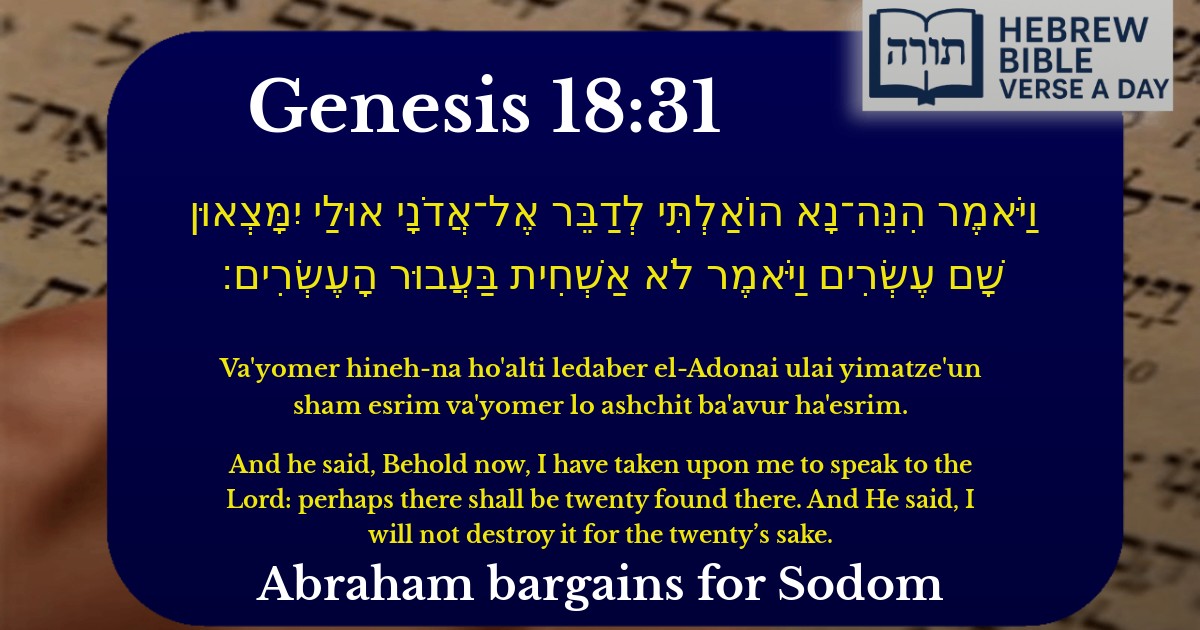Join Our Newsletter To Be Informed When New Videos Are Posted
Join the thousands of fellow Studends who rely on our videos to learn how to read the bible in Hebrew for free!
Hebrew Text
וַיֹּאמֶר הִנֵּה־נָא הוֹאַלְתִּי לְדַבֵּר אֶל־אֲדֹנָי אוּלַי יִמָּצְאוּן שָׁם עֶשְׂרִים וַיֹּאמֶר לֹא אַשְׁחִית בַּעֲבוּר הָעֶשְׂרִים׃
English Translation
And he said, Behold now, I have taken upon me to speak to the Lord: perhaps there shall be twenty found there. And He said, I will not destroy it for the twenty’s sake.
Transliteration
Va'yomer hineh-na ho'alti ledaber el-Adonai ulai yimatze'un sham esrim va'yomer lo ashchit ba'avur ha'esrim.
Hebrew Leining Text
וַיֹּ֗אמֶר הִנֵּֽה־נָ֤א הוֹאַ֙לְתִּי֙ לְדַבֵּ֣ר אֶל־אֲדֹנָ֔י אוּלַ֛י יִמָּצְא֥וּן שָׁ֖ם עֶשְׂרִ֑ים וַיֹּ֙אמֶר֙ לֹ֣א אַשְׁחִ֔ית בַּעֲב֖וּר הָֽעֶשְׂרִֽים׃
וַיֹּ֗אמֶר הִנֵּֽה־נָ֤א הוֹאַ֙לְתִּי֙ לְדַבֵּ֣ר אֶל־אֲדֹנָ֔י אוּלַ֛י יִמָּצְא֥וּן שָׁ֖ם עֶשְׂרִ֑ים וַיֹּ֙אמֶר֙ לֹ֣א אַשְׁחִ֔ית בַּעֲב֖וּר הָֽעֶשְׂרִֽים׃
🎵 Listen to leining
Parasha Commentary
📚 Talmud Citations
This verse is quoted in the Talmud.
📖 Berakhot 7a
The verse is referenced in a discussion about Abraham's dialogue with God regarding the destruction of Sodom, illustrating the concept of divine mercy and the power of righteous individuals to influence God's decrees.
📖 Sanhedrin 99b
The verse is cited in a broader discussion about the merit of the righteous and how their presence can protect a city or generation from destruction.


Context of the Verse
This verse (Bereshit 18:31) is part of Avraham Avinu's dialogue with Hashem regarding the fate of Sodom and Amorah. Avraham, demonstrating his deep compassion and commitment to justice, negotiates with Hashem to spare the cities if even a small number of righteous individuals can be found.
Avraham's Approach to Prayer
Rashi explains that Avraham's phrasing, "הִנֵּה־נָא הוֹאַלְתִּי" ("Behold now, I have taken upon me"), reflects his humility and hesitation in addressing the Almighty. Despite his close relationship with Hashem, Avraham approaches prayer with reverence, acknowledging his own unworthiness to make requests (Rashi on Bereshit 18:27). The Midrash (Bereishit Rabbah 49:8) further emphasizes that Avraham's prayer serves as a model for how tzaddikim advocate for mercy.
The Significance of Twenty Righteous Individuals
Avraham reduces his request from fifty to twenty righteous people, recognizing the severity of Sodom's wickedness. Ramban (Bereshit 18:31) suggests that twenty represents a critical mass—enough to influence the broader community positively. The Talmud (Sanhedrin 107a) teaches that even a small group of righteous individuals can sustain a city through their merit.
Hashem's Response
Hashem's reply, "לֹא אַשְׁחִית בַּעֲבוּר הָעֶשְׂרִים" ("I will not destroy it for the twenty’s sake"), underscores the principle of zechut avot (merit of the righteous). The Sforno notes that Hashem’s willingness to spare the cities for even twenty righteous people highlights His boundless mercy and the power of collective righteousness to avert judgment.
Lessons for Today